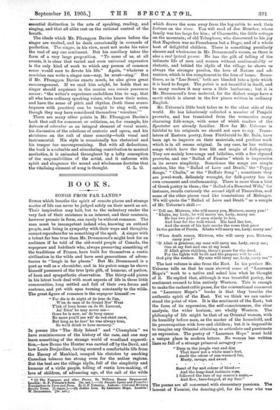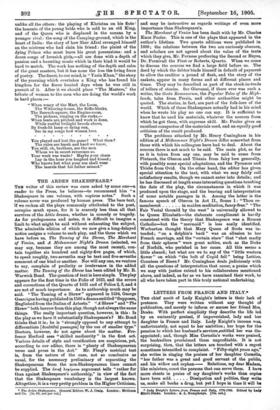Somas which breathe the spirit of remote places and strange
modes of life can never be judged solely on their merit as art. Their inspiration may halt, but to the sedentary reader the very fact of their existence is an interest, and their contents, however prosaic in form, can rarely be without romance. The man must be incompetent indeed who, knowing an outland people, and being in sympathy with their ways and thoughts, cannot reproduce for us something of the spell. A singer with a talent far less true than Mr. Drummond's might look for an audience if he told of the old-world people of Canada, the voyageurs and habitants who, always preserving something of the traditions of France, have built for themselves a rustic civilisation in the wilds and have sent generations of adven- turers to "laugh in far places." But Mr. Drummond is a poet as well as a chronicler, and in his patois songs he shows himself possessed of the true lyric gift, of humour, of pathos, of keen and sympathetic observation. The thirty-odd pieces in his latest book deal with most aspects of life in these little communities, long settled and full of their own forms and customs, and yet with eyes turning constantly to the wilds. The great figure of romance is the voyageur himself :- " For .dis is de night of de jonr de ran,
W'en de man of de Grand Nor' West T'ink of bees home on de St. Laurent, An' frien' he may never see—
Gone he is now, an' de beeg canoe No more you'll see wit' de red-shirt crew, But long as he leev' he was always true, So we'll drink to hens memory.'
In poems like " the Holy Island" and " Champlain" we have reminiscences of the history of the race, and one may learn something of the strange world of woodland supersti- tion,—how Bruno the Hunter was carried off by the Devil, and how Louis Desjardins, having secured a comfortable life from the Enemy of Mankind, escaped his clutches by smoking Canadian tobacco too strong even for the nether regions. But the best are the village idylls, full of the simplicity and humour of a virile people, telling of rustic love-making, of love of children, of advancing age, of the call of the wilds • (1) The Voyageur, and other Poems. By William Henry Drummond. - London 43i. P. Putnam's Sone. Da. net.1—(S) Panjabi Lyrics and Proverbs : Translations in Verse and Prose. By C. F. Usborne. Lahore : Civil and Military
easette Preen. rupee.1—(3) Indian Love. By Laurence Hope. London : - W. Heinemann. [Se. net.)
which draws the sons away from the log-cabin to seek their fortune on the river. You will read of Joe Boucher, whose family was too large for him ; of Charmette, the little cottage on the mountain; of old Telesphore, who discovered to his joy that Napoleon was no Frenchman but a Dago; and of a whole host of delightful children. There is something peculiarly sincere and wholesome in Mr. Drummond's verses, as there is also a real lyrical power. He has the gift of telling of the intimate life of men and women without sentimentality or rhetoric, and behind the idylls of the village he shows us always the stronger passion, the love of Nature and ad- venture, which is the complement to the love of home. Some- times, as in "Lac Souci," both are blended into a lyric which it is hard to forget. The patois is not beautiful in itself, and to many readers it may seem a little barbarous ; but it is Mr. Drummond's true material, for the dialect songs have a merit which is absent in the few pieces written in ordinary English.
Mr. Usborne's little book takes us to the other side of the world. He has laboriously collected a number of Panjabi proverbs, and has translated from the vernacular many charming folk-songs, with some of which readers of the Spectator are already familiar. How far Mr. Usborne is faithful to his originals we should not care to say. Trans- lators of Eastern poetry, from FitzGerald to Mr. Bain, have been apt to improve on their materials, and produce work which is in all senses original. In any case, he has written songs which have the true lilt and magic of folk-poetry. They are mainly love-songs and lullabies, with a few rhymed proverbs, and one "Ballad of Famine" which is impressive in its severe simplicity. Sometimes the songs are simple catches, like the " Ballad of Love and Death," the " Poppy Songs," " Cholla," or the "Buffalo Song " ; sometimes they are jewel-work, delicately wrought, for folk-poetry has its own ornament and craftsmanship. There is more than a hint of Greek poetry in them ; the " Ballad of a Deserted Wife," for instance, recalls curiously the second idyll of Theocritus, and some of the other pieces read like translations of Meleager. We will quote the "Ballad of Love and Death " as a sample of Mr. Usborne's skill
Tell me, Mistress, who will marry you, Mistress, marry you P'
Khaka, my Lady, he will marry me, Lady, marry me.
He has two yoke of oxen sturdy to hoe, And four for the well-wheel. His land lies low, And the scent of his hair mocks the roses that grow In the garden of Persia. Khaka will marry me, Lady, marry me.'
When death comes, Mistress, who will carry you, Mistress,
carry you?'
'If Allah is gracious, my sons will carry me, Lady, carry me ; One at my feet and one at my head.
If Allah gives children, there's peace for the dead, For the lights will be lit and the prayers will be said.
God pity the sonless. My sons will carry me, Lady, carry me."
The last volume is also from the East. In his preface Mr. Usborne tells us that he once showed some of "Laurence Hope's" work to a native and asked him what he thought of it. He replied that, although it was beautiful poetry, the sentiment seemed to him entirely Western. This is enough to make the rashest critic pause, for the conventional comment on "Laurence Hope's" books is that they breathe the authentic spirit of the East. Yet we think we can under- stand the point of view. It is the sentiment of the East; but the form of its expression, the self-consciousness, the clear analysis, the wider horizon, are wholly Western. The philosophy of life might be that of an Oriental woman, with its humility before man, as the master of the household, and its preoccupation with love and children; but it is impossible to imagine any Oriental attaining so articulate and passionate an expression. The poetry of " Laurence Hope " must hold a unique place in modem letters. No woman has written lines so fall of a strange primeval savagery :—
"Deep in the jungle vast and dim That knew not a white man's feet, I smelt the odour of sun-warmed fur, Musty, savage, and sweet.
• **** • • Scent of fur and colour of blood:— And the long-dead instincts rose,
I followed the lure of my season's mate,—
And flew, bare-fanged, at my foes."
The poems are all concerned with elementary passions. The lament of Yasmini, the dancing-girl, for the lover who was
unlike all the others : the playing of Khristna on his flute : the laments of the young bride who is sold to an old King, and of the Queen who is displaced in the zenana by a younger rival: the song of the Camping-ground, which is the heart of India : the story of how Sher Afzul revenged himself on the mistress who had slain his friend : the plaint of the dying Prince who must leave his great possessions : and a dozen songs of lovesick girls,—all are done with a depth of passion and a haunting music which in their kind it would be hard to match. The work has nothing of the depth and calm of the great masters, but it has none the less the living force of poetry. The finest, to our mind, is " Yasin Khan," the story of the yearning which overtakes a King who has found his kingdom for the fierce hunted days when he was still in
pursuit of it. After it we should place " The Masters," the tribute of woman to the men who are doing the world's work in hard places:— "When weary of the Mart, the Loom,
The Withering-house, the Riffie-blocks, The Barrack-square, the Engine-room,
The pickaxe, ringing on the rocks,— When tents are pitched and work is done,
While restful twilight broods above, By fresh-lit lamp or dying sun, See in my songs how women love.
....... • • You played and lost the game ? What then ? The rules are harsh and hard we know, You still, oh, brothers, are the men Whom we in secret reverence so.
Your work was waste? Maybe your share
Lay in the hour you laughed and kissed ; Who knows but what your son shall wear The laurels that his father missed."











































 Previous page
Previous page